fairlyquiteratherverypretty用法辨析
rather用法
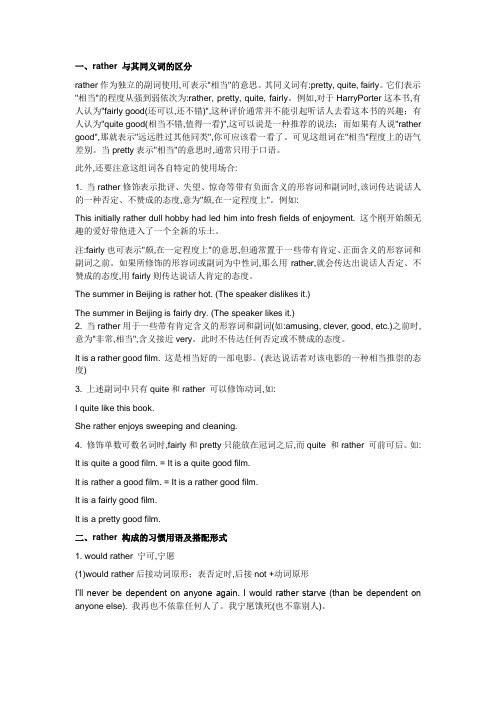
一、rather 与其同义词的区分rather作为独立的副词使用,可表示"相当"的意思。
其同义词有:pretty, quite, fairly。
它们表示"相当"的程度从强到弱依次为:rather, pretty, quite, fairly。
例如,对于HarryPorter这本书,有人认为"fairly good(还可以,还不错)",这种评价通常并不能引起听话人去看这本书的兴趣;有人认为"quite good(相当不错,值得一看)",这可以说是一种推荐的说法;而如果有人说"rather good",那就表示"远远胜过其他同类",你可应该看一看了。
可见这组词在"相当"程度上的语气差别。
当pretty表示"相当"的意思时,通常只用于口语。
此外,还要注意这组词各自特定的使用场合:1. 当rather修饰表示批评、失望、惊奇等带有负面含义的形容词和副词时,该词传达说话人的一种否定、不赞成的态度,意为"颇,在一定程度上"。
例如:This initially rather dull hobby had led him into fresh fields of enjoyment. 这个刚开始颇无趣的爱好带他进入了一个全新的乐土。
注:fairly也可表示"颇,在一定程度上"的意思,但通常置于一些带有肯定、正面含义的形容词和副词之前。
如果所修饰的形容词或副词为中性词,那么用rather,就会传达出说话人否定、不赞成的态度,用fairly则传达说话人肯定的态度。
The summer in Beijing is rather hot. (The speaker dislikes it.)The summer in Beijing is fairly dry. (The speaker likes it.)2. 当rather用于一些带有肯定含义的形容词和副词(如:amusing, clever, good, etc.)之前时,意为"非常,相当",含义接近very。
形容词知识清单

形容词易混知识清单一.程度副词fairly, quite, rather等用法比较在上述几个程度副词中,fairly程度最低,quite稍强,而rather程度则又强一些。
Not—fairly—quite—rather\pretty—veryIt’s a fairly good book. (这本书勉强可看) It’s a quite good book. (暗指这本书值得一看,虽然算不上最好的)It’s a rather good book. (暗含这本书出乎意料地好)1.rather 还用来修饰一些表示令人不愉快的形容词,而表示愉快的场合,常用fairly 来修饰形容词。
It’s rather cold today.It was fairly warm that day.2.rather 可以和too 连用,也可以修饰比较级,其他程度副词通常无此用法。
This book is rather too easy.It’s rather colder today than yesterday3.quite 可修饰没有程度差别的词,相当于completely 或absolutely ,表示完全地,绝对地。
His English is quite perfect.I’m not quite ready.They are not quite the same.但是肯定句中不能说quite the same,而应说exactly the same.4.quite 与rather 皆可与动词连用,但意思不同。
I quite agree with you.I rather think we are going to lose.二.形容词和副词的比较级1.大多数形容词和副词有原级,比较级和最高级。
原级变为比较级和最高级有三种方式;⑴单音节和少数双音节单词,一般在词尾加“er”或“est Young—younger—youngest old–older--oldest tall---taller---tallestsmall---smaller ---smallest以字母e结尾的单音节形容词,加-r 或- st,以重读闭音节词只有一个辅音字母时,应先双写辅音字母,再加-er或-est. big—bigger-biggestfat—fatter-fattest⑵双音节词和多音节词的比较级和最高级①以―辅音字母+y‖结尾的双音节词,先改―y‖为―i‖,再加-er 或-estearly-earlier-earliestthirsty-thirstier-thirstiesthappy-happier-happiestpretty-prettier-prettiest②部分双音节词或多音节词前面加more ,most构成比较级和最高级。
英语程度副词
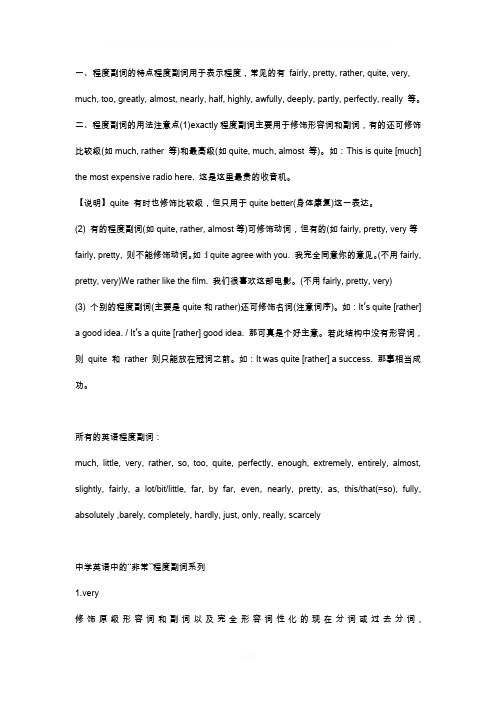
一、程度副词的特点程度副词用于表示程度,常见的有fairly, pretty, rather, quite, very, much, too, greatly, almost, nearly, half, highly, awfully, deeply, partly, perfectly, really 等。
二、程度副词的用法注意点(1)exactly程度副词主要用于修饰形容词和副词,有的还可修饰比较级(如much, rather 等)和最高级(如quite, much, almost 等)。
如:This is quite [much] the most expensive radio here. 这是这里最贵的收音机。
【说明】quite 有时也修饰比较级,但只用于quite better(身体康复)这一表达。
(2) 有的程度副词(如quite, rather, almost等)可修饰动词,但有的(如fairly, pretty, very等fairly, pretty, 则不能修饰动词。
如:I quite agree with you. 我完全同意你的意见。
(不用fairly, pretty, very)We rather like the film. 我们很喜欢这部电影。
(不用fairly, pretty, very)(3) 个别的程度副词(主要是quite和rather)还可修饰名词(注意词序)。
如:It’s quite [rather]a good idea. / It’s a quite [rather] good idea. 那可真是个好主意。
若此结构中没有形容词,则quite 和rather 则只能放在冠词之前。
如:It was quite [rather] a success. 那事相当成功。
所有的英语程度副词:much, little, very, rather, so, too, quite, perfectly, enough, extremely, entirely, almost, slightly, fairly, a lot/bit/little, far, by far, even, nearly, pretty, as, this/that(=so), fully, absolutely ,barely, completely, hardly, just, only, really, scarcely中学英语中的“非常”程度副词系列1.very修饰原级形容词和副词以及完全形容词性化的现在分词或过去分词,如:tired,ashamed,exciting等【注意】1)非形容词性化的分词不能用very修饰,可用much修饰.例:She is very pleased by his words.(×)She is much pleased by his words.(√)2)一些不分等级的形容词不能用very修饰,可用quite(completely)修饰.例:You are very wrong.(×)You are quite wrong.(√)3)部分以a开头的形容词不能用very修饰,可用much修饰.例:She was very afraid of dogs.(×)She was much afraid of dogs.(√)2.much1)修饰动词;2)修饰介词以及形容词和副词的比较级;例:a)The girl is much like her mother.这女孩非常像她妈妈。
pretty quite very的区别
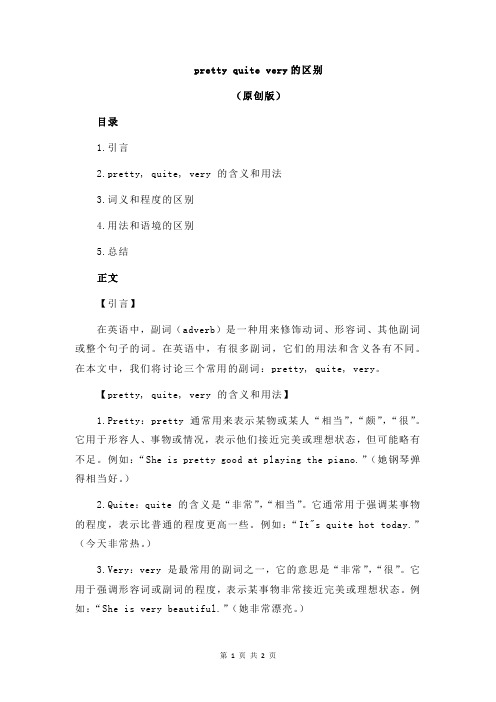
pretty quite very的区别(原创版)目录1.引言2.pretty, quite, very 的含义和用法3.词义和程度的区别4.用法和语境的区别5.总结正文【引言】在英语中,副词(adverb)是一种用来修饰动词、形容词、其他副词或整个句子的词。
在英语中,有很多副词,它们的用法和含义各有不同。
在本文中,我们将讨论三个常用的副词:pretty, quite, very。
【pretty, quite, very 的含义和用法】1.Pretty:pretty 通常用来表示某物或某人“相当”,“颇”,“很”。
它用于形容人、事物或情况,表示他们接近完美或理想状态,但可能略有不足。
例如:“She is pretty good at playing the piano.”(她钢琴弹得相当好。
)2.Quite:quite 的含义是“非常”,“相当”。
它通常用于强调某事物的程度,表示比普通的程度更高一些。
例如:“It"s quite hot today.”(今天非常热。
)3.Very:very 是最常用的副词之一,它的意思是“非常”,“很”。
它用于强调形容词或副词的程度,表示某事物非常接近完美或理想状态。
例如:“She is very beautiful.”(她非常漂亮。
)【词义和程度的区别】尽管这三个词都表示程度,但它们的含义和程度有所不同。
Pretty 表示接近完美但略有不足,quite 表示比普通程度更高,very 表示非常接近完美。
在实际使用中,需要根据所描述的事物和语境选择合适的词。
【用法和语境的区别】1.Pretty:pretty 通常用于形容接近理想状态的事物或人,但在某些情况下可能带有贬义。
例如:“Her answer was pretty good, but it could have been better.”(她的答案还算不错,但本可以更好。
)2.Quite:quite 用于强调事物的程度,表示比普通程度更高。
fairly,quite,rather和very的区别

1、语气由弱到强2、quite可修饰无比较级的adj. / adv. (如:right, mistaken, dead, possible等)It is quite impossible to start at once.3、rather可跟比较级和与too连用。
It’s rather warmer.She was rather too late.4、rather与quite可修饰动词或放在名词前。
I rather like her.I quite agree with you.It’s rather a pity.He gave us quite a surprise.She is quite a beauty.5、very可修饰最高级或与first, last, own 等连用。
She has the very best quality.It’s six o’clock at the very latest.He is the very first man to arrive.This is the very last drop.6、very可与sorry, glad或much等连用。
I am very sorry to hear the news.Thank you very much.7、fairly修饰动词时表示“公正地,公平地”。
You must treat her fairly.8、very修饰名词时是形容词,意思是“正是的”,“恰好的”。
This is the very thing I want.9、rather可放在不定冠词之前或之后,但必须放在定冠词the 之后。
fairly,very放在冠词之后。
quite放在冠词之前。
He is rather a tall boy .= He is a rather tall boy.He is the rather tall boy.This is a fairly easy book.She is quite a good player.He is the very man I’m looking for.10、quite可与another, a few, a lot of 等连用。
Fairly

Fairly ,quite, rather ,pretty这四个词的意思都是"很,非常",都可以用来改变形容词和副词的份量。
1.Fairly在这四个词中份量最轻,如果你说某人fairly nice 或fairly pretty,那几乎算不上恭维。
如果说一部电影fairly good,那意思是"勉强还可以看";但不值得跑那么远的路去看,等等。
Quite在份量上比fairly稍强。
如果你认为某部电影quite good,那就意在推荐。
它相当于汉语的"十分,完全",用来加强语气;当它与有比较级的形容词、副词连用于表相当,还算,此时它在程度上比fairly强,但不及rather, pretty或very。
Quite不用来修饰比较级,但表示身体康复时可说quite better,完全康复了。
Rather 相当于more than usually expected,表示的程度很重。
在使用它的时候要注意:a. rather修饰的形容词如果后面有一个可数名词时,不定冠词置于rather 之前,也可放于其后(与quite 的用法一样)。
如:a rather large crowd/rather a large crowda quite large crowd/quite a large crowdb. rather 常用来修饰一些表示"不好"的形容词或副词,fairly只宜修饰表示"好"的形容词或副词,只是程度上不如rather强;rather 也可修饰表示"好"的形容词或副词表示"很,相当"。
Rather可以与too 连用,fairly 不能接too; rather可以修饰比较级,fairly 不能。
Pretty 和rather, very 意思相同,如果把这几个词按程度由弱到强排列的话,从"无"到"最"的情况如下:not→fairly→quite→rather→very。
新版9A Unit4重点知识点讲义
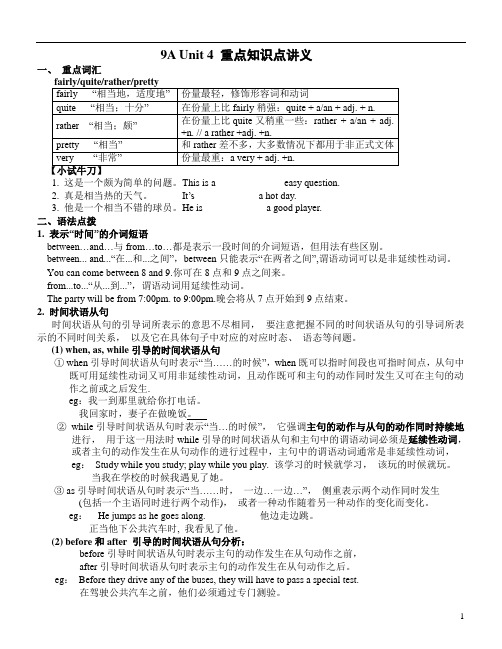
9A Unit 4 重点知识点讲义一、重点词汇fairly/quite/rather/prettyfairly “相当地,适度地”份量最轻,修饰形容词和动词quite “相当;十分”在份量上比fairly稍强:quite + a/an + adj. + n.rather “相当;颇”在份量上比quite又稍重一些:rather + a/an + adj.+n. // a rather +adj. +n.pret ty “相当”和rather差不多,大多数情况下都用于非正式文体very “非常”份量最重:a very + adj. +n.【小试牛刀】1. 这是一个颇为简单的问题。
This is a _____________ easy question.2. 真是相当热的天气。
It’s ____________ a hot day.3. 他是一个相当不错的球员。
He is ____________ a good player.二、语法点拨1. 表示“时间”的介词短语bet ween…and…与from…to…都是表示一段时间的介词短语,但用法有些区别。
between... and...“在...和...之间”,between只能表示“在两者之间”,谓语动词可以是非延续性动词。
You can come between 8 and 9.你可在8点和9点之间来。
from...to...“从...到...”,谓语动词用延续性动词。
The party will be from 7:00pm. to 9:00pm.晚会将从7点开始到9点结束。
2. 时间状语从句时间状语从句的引导词所表示的意思不尽相同,要注意把握不同的时间状语从句的引导词所表示的不同时间关系,以及它在具体句子中对应的对应时态、语态等问题。
(1) when, as, while引导的时间状语从句① when引导时间状语从句时表示“当……的时候”,when既可以指时间段也可指时间点,从句中既可用延续性动词又可用非延续性动词,且动作既可和主句的动作同时发生又可在主句的动作之前或之后发生.eg:我一到那里就给你打电话。
Rather用法辨析辨析
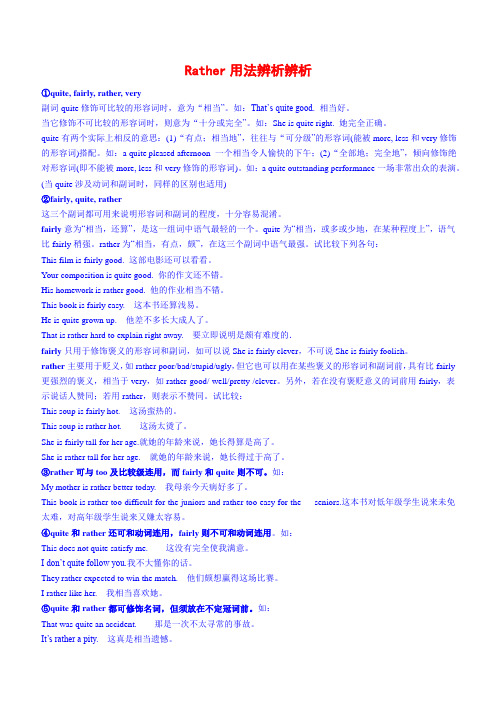
Rather用法辨析辨析①quite, fairly, rather, very副词quite修饰可比较的形容词时,意为“相当”。
如:That’s quite good. 相当好。
当它修饰不可比较的形容词时,则意为“十分或完全”。
如:She is quite right. 她完全正确。
quite有两个实际上相反的意思:(1)“有点;相当地”,往往与“可分级”的形容词(能被more, less和very修饰的形容词)搭配。
如:a quite pleased afternoon 一个相当令人愉快的下午;(2)“全部地;完全地”,倾向修饰绝对形容词(即不能被more, less和very修饰的形容词)。
如:a quite outstanding performance一场非常出众的表演。
(当quite涉及动词和副词时,同样的区别也适用)②fairly, quite, rather这三个副词都可用来说明形容词和副词的程度,十分容易混淆。
fairly意为“相当,还算”,是这一组词中语气最轻的一个。
quite为“相当,或多或少地,在某种程度上”,语气比fairly稍强。
rather为“相当,有点,颇”,在这三个副词中语气最强。
试比较下列各句:This film is fairly good. 这部电影还可以看看。
Y our composition is quite good. 你的作文还不错。
His homework is rather good. 他的作业相当不错。
This book is fairly easy.这本书还算浅易。
He is quite grown up.他差不多长大成人了。
That is rather hard to explain right away.要立即说明是颇有难度的.fairly只用于修饰褒义的形容词和副词,如可以说She is fairly clever,不可说She is fairly foolish。
fairly, quite, rather, pretty, very单词辨析

1.单词辨析:fairly, quite, rather, pretty, veryFairly, quite, rather,pretty and very are all used to say that something is true to some degree, butnot completely or extremely : 这几个词都被用来说某事真实到某种程度,但还不到完全或极端的程度(一般是用来修饰形容词、副词、名词)。
比如:She's rather shy.You should find the test fairly easy.|It took quite a long time (NOT a quite long time).His English is pretty good.Rather is fairly formal but can be used in spoken English, especially British English. In American Englishit is more usual to use pretty . In both American and British English, pretty is more usual in speech th an in writing. (rather用法相当正式,可以用到口语中,特别是英国英语中。
在美国英语中使用pretty更为常见。
无论是英国英语还是美国英语中,pretty在口语中要比在书面语中更为常见。
)Quite can also be used in front of an adjective or adverb,;and in British English used infront of a verb, it means 'completely' or “absolutely”. This is a fairly formal use(在英国英语中,quite可以用在一个形容词或副词前,其意思是“相当、颇、的确”;用到动词前的意思相当于“completely”或“absolutely”,即“完全""绝对"之意。
quite修饰其他成分,程度到底是怎么变化的

quite修饰其他成分,程度到底是怎么变化的Quite 是一个程度副词,根据它所修饰的成分不同主要有两个意思,而且这两个意思所表示的程度一个比一个大,也就是说它遇弱则强,遇强则更强,是一个经常被低估或大材小用的单词。
一、修饰可分级形容词或副词当quite 修饰可分级的形容词或副词连用时,意为“颇;相当;某种程度上”,相当于 very,pretty,fairly 或 rather 例如:I felt quite bitter about it at the time.当时我对这件事感到相当怨愤。
She comes to visit you quite often, doesn’t she?她经常来看你,是吗?He walked quite fast until they were out of sight.他走得很快,直到他们看不见为止。
解析:以上的 bitter,often 或 fast 都是可分级的形容词或副词,因为它们都有对应的比较级和最高级。
以下是常见的原级意思一样的可分形容词与不可分形容词对照表,在要表达程度的场合有的时候可以直接使用不可分形容词:二、修饰不可分形容词或副词当quite 修饰不可分级的形容词或副词连用时,意为“完全;十分;非常;彻底”,相当于 completely,absolutely 或 entirely 等,例如:The scenery was quite incredible.景色真是令人难以置信。
This is quite impossible.这是不可能的。
Steve Jobs, the chairman of Pixar, is quite obviously fond of computers.皮克斯公司董事长史蒂夫·乔布斯显然非常喜欢电脑。
三、quite 与名词1. 结构“quite + a/an + 名词”常用来强调名词或使名词更重要,例如:It's been quite a day, one way and another. 从几方面看,这是不寻常的一天。
英语表示程度词

英语表示程度词新媒体平台上,英语表示程度词广受欢迎,尤其是年轻用户经常拿它们来对话,这不仅让英语变得更有趣,而且也比较容易表达个人情感。
那么,英语表示程度词有哪些?英语的表示程度词通常被分为三个等级,包括程度表达(degree expression)、一般表达(general expression)和强化表达(strengthened expression)。
程度表达包括:Some, Fairly, Quite, Very, Extremely, Incredibly等。
其中Some表示一点,Fairly表示相对较多,Quite表示比较多,Very表示非常多,Extremely表示极多,Incredibly表示极其多。
例如:I feeling some better. (我感觉好一点了),I feeling fairly happy. (我感到比较开心),This dress is quite expensive. (这件衣服比较贵),I very satisfied with the results. (我对结果非常满意),That was an incredibly long journey. (那是一段极其漫长的旅程)。
一般表达包括:Rather, Fairly, Moderately, Pretty, Quite, Rather, Really等。
其中Rather表示相当多,Fairly表示比较多,Moderately表示适度,Pretty表示相当,Quite表示比较,Rather表示较多,Really表示非常多。
例如:This bed is rather comfortable. (这张床相当舒服),The food is fairly good. (这个食物比较好),They are moderately interested in the project. (他们对这个项目有一定兴趣),This book is pretty expensive. (这本书相当贵),That movie was quite entertaining. (那部电影比较有趣),This test is rather difficult. (这个测试较难),The play was really enjoyable. (这个剧本非常有趣)。
Fairly和rather用法上的区别
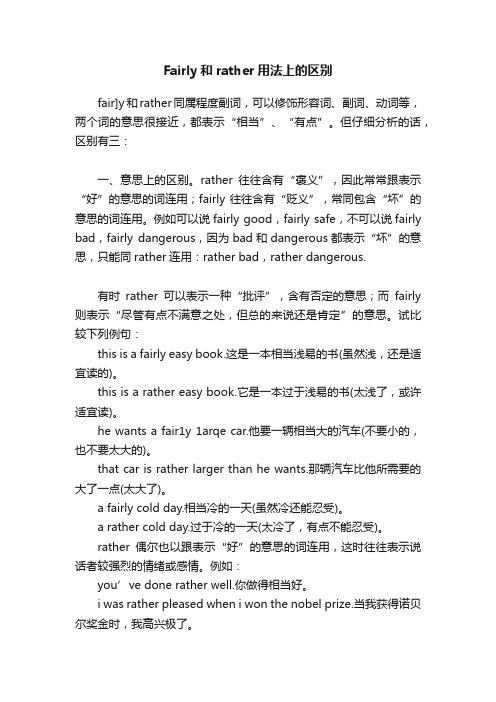
Fairly和rather用法上的区别fair]y和rather同属程度副词,可以修饰形容词、副词、动词等,两个词的意思很接近,都表示“相当”、“有点”。
但仔细分析的话,区别有三:一、意思上的区别。
rather往往含有“褒义”,因此常常跟表示“好”的意思的词连用;fairly往往含有“贬义”,常同包含“坏”的意思的词连用。
例如可以说fairly good,fairly safe,不可以说fairly bad,fairly dangerous,因为bad和dangerous都表示“坏”的意思,只能同rather连用:rather bad,rather dangerous.有时rather可以表示一种“批评”,含有否定的意思;而fairly 则表示“尽管有点不满意之处,但总的来说还是肯定”的意思。
试比较下列例句:this is a fairly easy book.这是一本相当浅易的书(虽然浅,还是适宜读的)。
this is a rather easy book.它是一本过于浅易的书(太浅了,或许适宜读)。
he wants a fair1y 1arqe car.他要一辆相当大的汽车(不要小的,也不要太大的)。
that car is rather larger than he wants.那辆汽车比他所需要的大了一点(太大了)。
a fairly cold day.相当冷的一天(虽然冷还能忍受)。
a rather cold day.过于冷的一天(太冷了,有点不能忍受)。
rather偶尔也以跟表示“好”的意思的词连用,这时往往表示说话者较强烈的情绪或感情。
例如:you’ve done rather well.你做得相当好。
i was rather pleased when i won the nobel prize.当我获得诺贝尔奖金时,我高兴极了。
二、rather可以和比较级形容词或者too连用,fairly则不行。
英语副词词汇辨析方法

英语副词词汇辨析方法副词在英语语法中起到修饰动词、形容词、副词以及整个句子的作用。
准确使用副词词汇是提高英语表达能力的重要一环。
然而,由于副词的种类繁多,容易引发混淆和错误使用。
本文将介绍几种常见的英语副词词汇并讨论它们的辨析方法。
一、程度副词1. very:非常,常用来修饰形容词或副词,表示高度程度。
2. quite:相当,用于修饰形容词或副词,表达程度较高但没有达到极限。
3. rather:相当,用于修饰形容词或副词,意味着相对程度较高。
4. pretty:相当,通常修饰形容词,表示程度比较高但程度低于very。
5. fairly:相当,修饰形容词或副词,程度介于不高不低。
6. extremely:极其,用于修饰形容词或副词,表示程度非常高。
二、方式副词1. carefully:小心地,表示动作或行为小心细致。
2. quickly:快速地,表示动作或行为迅捷。
3. easily:容易地,表示动作或行为容易实现。
4. thoroughly:彻底地,表示动作或行为完全无遗漏。
5. quietly:安静地,表示动作或行为悄无声息。
三、时间副词1. always:总是,在过去、现在和未来都普遍存在。
2. often:经常,表示频率很高。
3. sometimes:有时候,表示不确定的时间。
4. hardly:几乎不,表示极少或接近于没有。
5. never:从不,表示永远没有发生过或不可能发生。
四、地点副词1. here:这里,在附近的地方。
2. there:那里,在离说话人较远的地方。
3. everywhere:到处,在每个地方。
4. nowhere:无处,在任何地方都没有。
五、频率副词1. always:总是,表示永恒的频率。
2. often:经常,表示频繁的频率。
3. sometimes:有时候,表示偶尔的频率。
4. rarely:很少,表示罕见的频率。
5. never:从不,表示完全没有的频率。
fairly quiet very区别

fairly, quite, rather, very “很”“十分”“相当”1、语气由弱到强2、quite可修饰无比较级的adj. / adv. (如:right, mistaken, dead, possible等)It is quite impossible to start at once.3、rather可跟比较级和与too连用。
It’s rather warmer.She was rather too late.4、rather与quite可修饰动词或放在名词前。
I rather like her.I quite agree with you.It’s rather a pity.He gave us quite a surprise.She is quite a beauty.5、very可修饰最高级或与first, last, own 等连用。
She has the very best quality.It’s six o’clock at the very latest.He is the very first man to arrive.This is the very last drop.6、very可与sorry, glad或much等连用。
I am very sorry to hear the news.Thank you very much.7、fairly修饰动词时表示“公正地,公平地”。
You must treat her fairly.8、very修饰名词时是形容词,意思是“正是的”,“恰好的”。
This is the very thing I want.9、rather可放在不定冠词之前或之后,但必须放在定冠词the 之后。
fairly,very放在冠词之后。
quite放在冠词之前。
He is rather a tall boy .= He is a rather tall boy.He is the rather tall boy.This is a fairly easy book.She is quite a good player.He is the very man I’m looking for.10、quite可与another, a few, a lot of 等连用。
fairlyquiterather及very的用法区别

r
l
,
qu ite
,
ra
th
e r
及
v e r
y
的 用 法 区 别 刘 洪
.
波
这 四个词 周时都是表程度 的 剧词
一 定的主观色彩
.
.
且语义 含糊
.
灵活多变
使用时常 带 有
.
所越
.
要 十 分确切地 区 分 这四 书 司是 很不 容 易的
笔 者 拟从
似 下 几 个方面加 以区 别 :
一
,
、
程度 不同
、
文患 作文
P
a
.
求解 四 用 词典 》 及
/ v e
英语 用法指南
,
,
,
5. 8)
q u i te
、
r a
t
h叮 可直接修饰动词
u
f
i r l了
较少
,
r
r
则不能 南》
,
例如
:
t 1 q ie
11肠 b
,
e r
(见
《 英语用法指
p 肠 。 了)
.
1 do
一
n
t q
u
te 玉
a
g
r e
, i th
yo
d
.
r r 比e a
.
常用 以 修饰一 些 表示不偷快的 形容词
It ’ 5
r
例如
5 q
o
:
t a
he
r
帕l d
r
t h i:
m
o r n
iu g
.
( 见 费 致德
英语程度副词
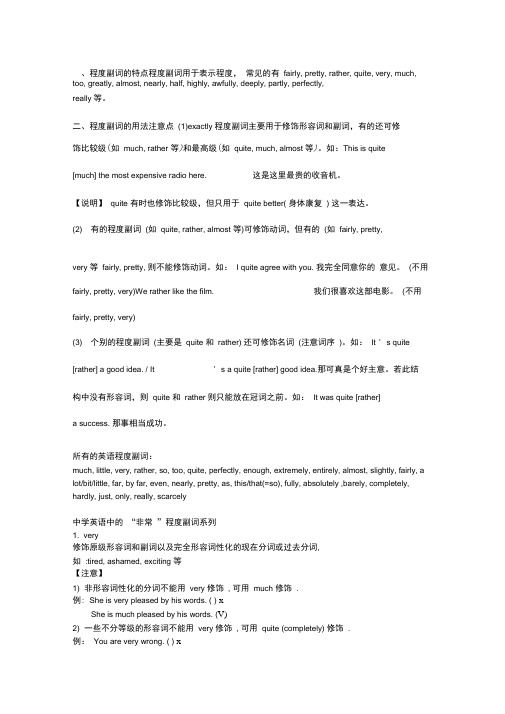
、程度副词的特点程度副词用于表示程度,常见的有fairly, pretty, rather, quite, very, much, too, greatly, almost, nearly, half, highly, awfully, deeply, partly, perfectly,really 等。
二、程度副词的用法注意点(1)exactly 程度副词主要用于修饰形容词和副词,有的还可修饰比较级(如much, rather 等)和最高级(如quite, much, almost 等)。
如:This is quite [much] the most expensive radio here. 这是这里最贵的收音机。
【说明】quite 有时也修饰比较级,但只用于quite better( 身体康复) 这一表达。
(2) 有的程度副词(如quite, rather, almost 等)可修饰动词,但有的(如fairly, pretty,very 等fairly, pretty, 则不能修饰动词。
如:I quite agree with you. 我完全同意你的意见。
(不用fairly, pretty, very)We rather like the film. 我们很喜欢这部电影。
(不用fairly, pretty, very)(3) 个别的程度副词(主要是quite 和rather) 还可修饰名词(注意词序)。
如:It ' s quite [rather] a good idea. / It ' s a quite [rather] good idea.那可真是个好主意。
若此结构中没有形容词,则quite 和rather 则只能放在冠词之前。
如:It was quite [rather]a success. 那事相当成功。
所有的英语程度副词:much, little, very, rather, so, too, quite, perfectly, enough, extremely, entirely, almost, slightly, fairly, a lot/bit/little, far, by far, even, nearly, pretty, as, this/that(=so), fully, absolutely ,barely, completely, hardly, just, only, really, scarcely中学英语中的“非常”程度副词系列1. very修饰原级形容词和副词以及完全形容词性化的现在分词或过去分词,如:tired, ashamed, exciting 等【注意】1) 非形容词性化的分词不能用very 修饰, 可用much 修饰.例: She is very pleased by his words. ( ) xShe is much pleased by his words. (V)2) 一些不分等级的形容词不能用very 修饰, 可用quite (completely) 修饰.例:You are very wrong. ( ) xYou are quite wrong. ( V)3) 部分以 a 开头的形容词不能用very 修饰, 可用much 修饰.例:She was very afraid of dogs. ( ) xShe was much afraid of dogs. (V)2. much1) 修饰动词;2) 修饰介词以及形容词和副词的比较级;例:a) The girl is much like her mother. 这女孩非常像她妈妈。
英语程度副词

一、程度副词的特点程度副词用于表示程度,常见的有fairly, pretty, rather, quite, very, much, too, greatly, almost, nearly, half, highly, awfully, deeply, partly, perfectly, really 等。
二、程度副词的用法注意点(1)exactly程度副词主要用于修饰形容词和副词,有的还可修饰比较级(如much, rather 等)和最高级(如quite, much, almost 等)。
如:This is quite [much] the most expensive radio here. 这是这里最贵的收音机。
【说明】quite 有时也修饰比较级,但只用于quite better(身体康复)这一表达。
(2) 有的程度副词(如quite, rather, almost等)可修饰动词,但有的(如fairly, pretty, very等fairly, pretty, 则不能修饰动词。
如:I quite agree with you. 我完全同意你的意见。
(不用fairly, pretty, very)We rather like the film. 我们很喜欢这部电影。
(不用fairly, pretty, very)(3) 个别的程度副词(主要是quite和rather)还可修饰名词(注意词序)。
如:It’s quite [rather]a good idea. / It’s a quite [rather] good idea. 那可真是个好主意。
若此结构中没有形容词,则quite 和rather 则只能放在冠词之前。
如:It was quite [rather] a success. 那事相当成功。
所有的英语程度副词:much, little, very, rather, so, too, quite, perfectly, enough, extremely, entirely, almost, slightly, fairly, a lot/bit/little, far, by far, even, nearly, pretty, as, this/that(=so), fully, absolutely ,barely, completely, hardly, just, only, really, scarcely中学英语中的“非常”程度副词系列1.very修饰原级形容词和副词以及完全形容词性化的现在分词或过去分词,如:tired,ashamed,exciting等【注意】1)非形容词性化的分词不能用very修饰,可用much修饰.例:She is very pleased by his words.(×)She is much pleased by his words.(√)2)一些不分等级的形容词不能用very修饰,可用quite(completely)修饰.例:You are very wrong.(×)You are quite wrong.(√)3)部分以a开头的形容词不能用very修饰,可用much修饰.例:She was very afraid of dogs.(×)She was much afraid of dogs.(√)2.much1)修饰动词;2)修饰介词以及形容词和副词的比较级;例:a)The girl is much like her mother.这女孩非常像她妈妈。
fairly, quite, rather, pretty,very用法区别
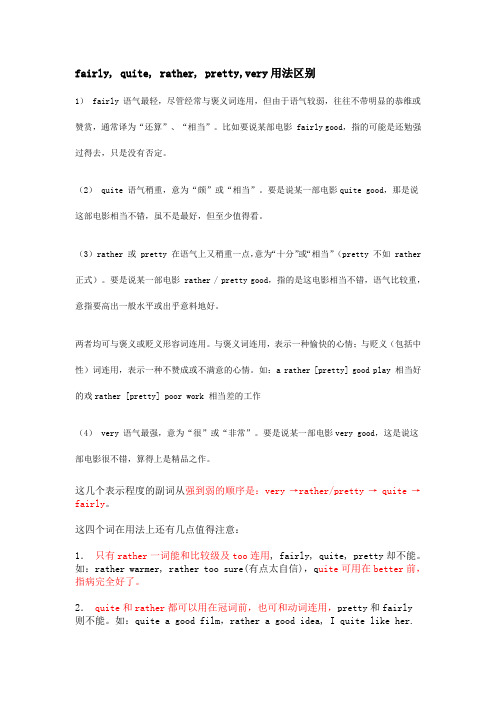
fairly, quite, rather, pretty,very用法区别1) fairly 语气最轻,尽管经常与褒义词连用,但由于语气较弱,往往不带明显的恭维或赞赏,通常译为“还算”、“相当”。
比如要说某部电影 fairly good,指的可能是还勉强过得去,只是没有否定。
(2) quite 语气稍重,意为“颇”或“相当”。
要是说某一部电影quite good,那是说这部电影相当不错,虽不是最好,但至少值得看。
(3) rather 或 pretty 在语气上又稍重一点,意为“十分”或“相当”(pretty 不如 rather 正式)。
要是说某一部电影 rather / pretty good,指的是这电影相当不错,语气比较重,意指要高出一般水平或出乎意料地好。
两者均可与褒义或贬义形容词连用。
与褒义词连用,表示一种愉快的心情;与贬义(包括中性)词连用,表示一种不赞成或不满意的心情。
如:a rather [pretty] good play 相当好的戏rather [pretty] poor work 相当差的工作(4) very 语气最强,意为“很”或“非常”。
要是说某一部电影very good,这是说这部电影很不错,算得上是精品之作。
这几个表示程度的副词从强到弱的顺序是:very →rather/pretty → qui t e → fairly。
这四个词在用法上还有几点值得注意:1.只有rather一词能和比较级及too连用, fairly, quite, pretty却不能。
如:rather warmer, rather too sure(有点太自信),q uite可用在better前,指病完全好了。
2.quite和rather都可以用在冠词前,也可和动词连用,pretty和fairly则不能。
如:quite a good film,rather a good idea, I quite like her.或I rather enjoy doing nothing.3. quite, fairly,和rather也可放在a/an后,但名词前必须有形容词时。
pretty quite very的区别
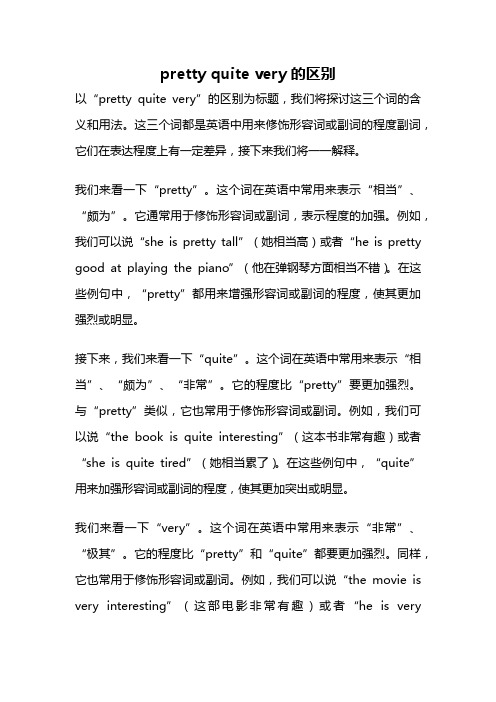
pretty quite very的区别以“pretty quite very”的区别为标题,我们将探讨这三个词的含义和用法。
这三个词都是英语中用来修饰形容词或副词的程度副词,它们在表达程度上有一定差异,接下来我们将一一解释。
我们来看一下“pretty”。
这个词在英语中常用来表示“相当”、“颇为”。
它通常用于修饰形容词或副词,表示程度的加强。
例如,我们可以说“she is pretty tall”(她相当高)或者“he is pretty good at playing the piano”(他在弹钢琴方面相当不错)。
在这些例句中,“pretty”都用来增强形容词或副词的程度,使其更加强烈或明显。
接下来,我们来看一下“quite”。
这个词在英语中常用来表示“相当”、“颇为”、“非常”。
它的程度比“pretty”要更加强烈。
与“pretty”类似,它也常用于修饰形容词或副词。
例如,我们可以说“the book is quite interesting”(这本书非常有趣)或者“she is quite tired”(她相当累了)。
在这些例句中,“quite”用来加强形容词或副词的程度,使其更加突出或明显。
我们来看一下“very”。
这个词在英语中常用来表示“非常”、“极其”。
它的程度比“pretty”和“quite”都要更加强烈。
同样,它也常用于修饰形容词或副词。
例如,我们可以说“the movie is very interesting”(这部电影非常有趣)或者“he is verytalented”(他非常有才华)。
在这些例句中,“very”用来加强形容词或副词的程度,使其更加突出或明显。
“pretty”、“quite”和“very”这三个词在程度上有一定差异。
它们分别表示不同程度的加强,其中“pretty”表示程度较弱,相当于“相当”或“颇为”;“quite”表示程度较强,相当于“非常”或“很是”;而“very”则表示程度最强,相当于“非常”或“极为”。
- 1、下载文档前请自行甄别文档内容的完整性,平台不提供额外的编辑、内容补充、找答案等附加服务。
- 2、"仅部分预览"的文档,不可在线预览部分如存在完整性等问题,可反馈申请退款(可完整预览的文档不适用该条件!)。
- 3、如文档侵犯您的权益,请联系客服反馈,我们会尽快为您处理(人工客服工作时间:9:00-18:30)。
fairly, quite, rather, very, pretty用法辨析
这几个词都可表示程度,用法区别如下:
一、含义上的区别
(1) fairly 语气最轻,尽管经常与褒义词连用,但由于语气较弱,往往不带明显的恭维或赞赏,通常译为“还算”、“相当”。
比如要说某部电影fairly good,指的可能是还勉强过得去,只是没有否定。
此外,fairly adv.还可表示“公正地”,“按规矩地”;“光明正大地”
He told the facts fairly.他实事求是地叙述这些事实。
(2) quite 语气稍重,意为“颇”或“相当”。
要是说某一部电影quite good,那是说这部电影相当不错,虽不是最好,但至少值得看。
(3) rather 或pretty 在语气上又稍重一点,意为“十分”或“相当”(pretty 不如rather 正式)。
要是说某一部电影rather / pretty good,指的是这电影相当不错,语气比较重,意指要高出一般水平或出乎意料地好。
两者均可与褒义或贬义形容词连用。
与褒义词连用,表示一种愉快的心情,与贬义(包括不褒不贬)词连用,表示一种不赞成或不满意的心情。
如:
a rather [pretty] good play 相当好的戏
rather [pretty] poor work 相当差的工作
(4) very 语气最强,意为“很”或“非常”。
要是说某一部电影very good,这是说这部电影很不错,算得上是精品之作。
这些词语气的轻重可大致描述为:
(not) →fairly →quite →rather / pretty →very
二、用法上的差别
(1) 以上各词中,只有rather 可以与比较级以及副词too (太) 连用。
如:
1.It’s rather colder today. 今天冷多了。
2.This one is rather too large. 这个稍大了一点。
注:quite 有时也与比较级连用, 但通常只限于quite better (身体好)这一表达中。
(2) rather 和quite 有时可直接修饰动词, 而其他几个副词一般不这样用。
如:
1.I quite agree with you. 我完全同意你(的意见)。
2.We rather like the book. 我们很喜欢这本书。
3.I was quite busy last week.我上星期相当忙。
4.She is quite pretty, but unhealthy-looking.她颇有几分姿色,但看起来并不健康。
5.She was quite behind the age.她完全落后于时代了。
6.This is a quite comfortable house.这是所相当舒适的房子。
(3) rather, quite 与“冠词+形容词+名词”连用时, 通常置于冠词之前,有时也可放在冠词之后。
但遇此类似情况,very 或fairly 则只能放在冠词之后(形容词之前)。
如:
1.It’s quite [rather] a good idea.
2.It’s a quite [rather] good idea. 那可真是个好主意。
注:若此结构中没有形容词,则quite 和rather 则只能放在冠词之前。
如:
1.It was quite [rather] a success. 那事相当成功。
2.Our maths teacher is quite a character我们的数学老师真有点与众不同。
3.He is quite a good actor.他是一个相当好的演员。
4.He was rather tired.他有些疲倦了。
5.You have done rather well.你做得相当不错。
(4)rather(常与than连用)更
1.These shoes are comfortable rather than pretty.这双鞋不好看,但是舒服。
2.American young people would rather get advice from strangers.美国的年轻人宁可从陌生人那里获取咨询。
3.We would rather receive money than the usual gifts.我们宁可接受钱而不希望受到通常的礼物。
4.We would rather rent the house than buy it outright. 我们宁可租这幢房子,也不愿直接买下它。
5.I had rather be dead than be a slave. 我宁可死去,也不愿意当奴隶。
6.He resigned rather than take part in such a dishonest transaction .他宁愿辞职也不愿意参加这样一种欺骗的交易。
(5) 通常只用quite修饰不可分级的形容词(如:right, wrong, ready, full, empty, perfect, impossible, alone, unique 等,此时quite 并不表示“相当”或“很”,而表示“完全”。
如:
1.You’re quite right (wrong). 你完全正确(错了)。
2.That’s quite impossible. 那完全不可能。
(6) fairly 语气最轻,尽管经常与褒义词连用,但由于语气较弱,往往不带明显的恭维或赞赏,通常译为“还算”、“相当”。
比如要说某部电影fairly good,指的可能是还勉强过得去,只是没有否定。
1.She paints fairly well.她画得相当好。
2.This bed is fairly soft.这个床还算软。
3.The speaker seems to be fairly apprised of the situation in the Far East.报告人似乎对中东局势
相当熟悉。
4.She speaks Spanish fairly well.她的西班牙语说得相当好。
5.I was fairly sure that I would go to the party.我很可能去参加晚会(fairly适当的程度)。
6.He was fairly beside himself with joy. (fairly完全地;全然地)他欣喜若狂。
7.befairly beside oneself简直疯了
8.He was fairly beside himself with rage.他气得快疯了。
9.He was fairly beside himself with joy.他欣喜若狂。
